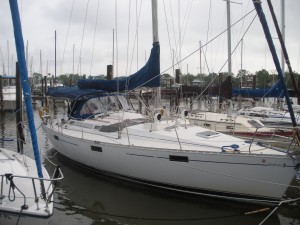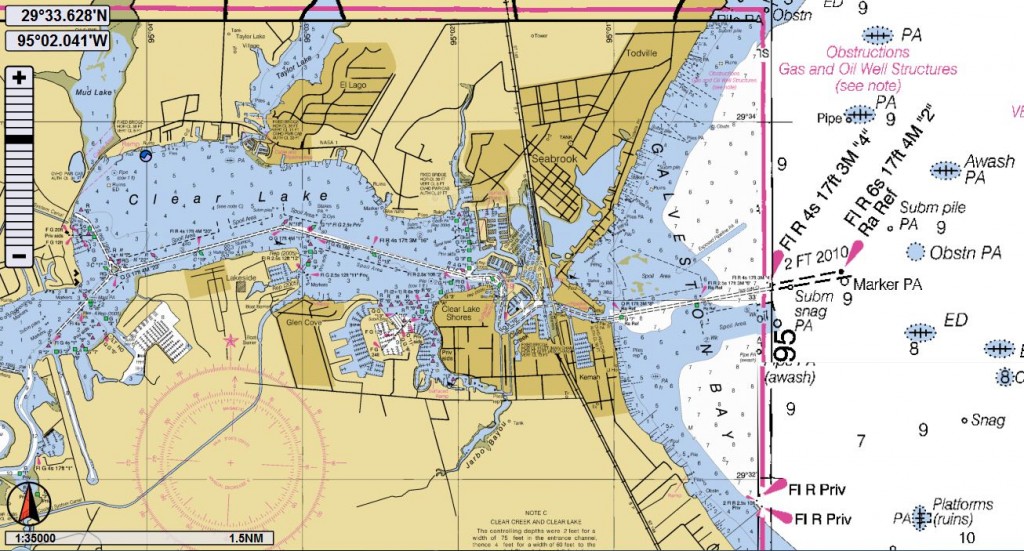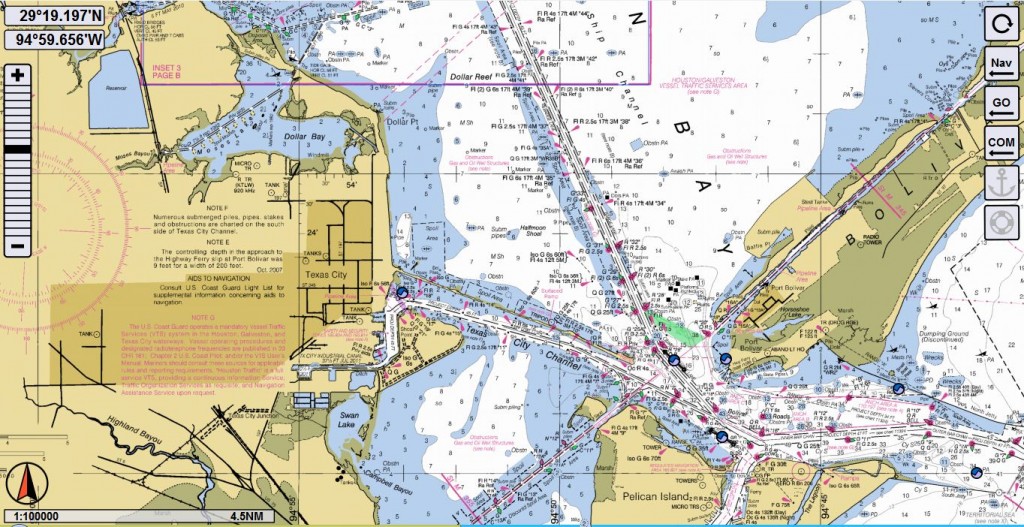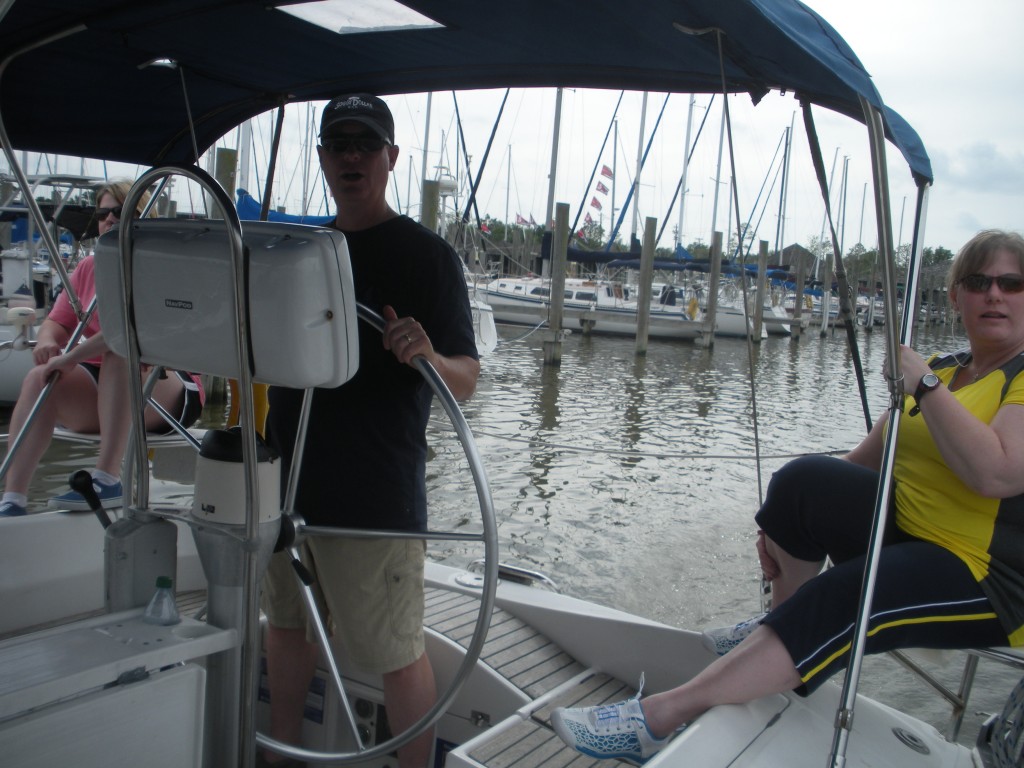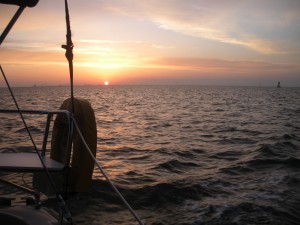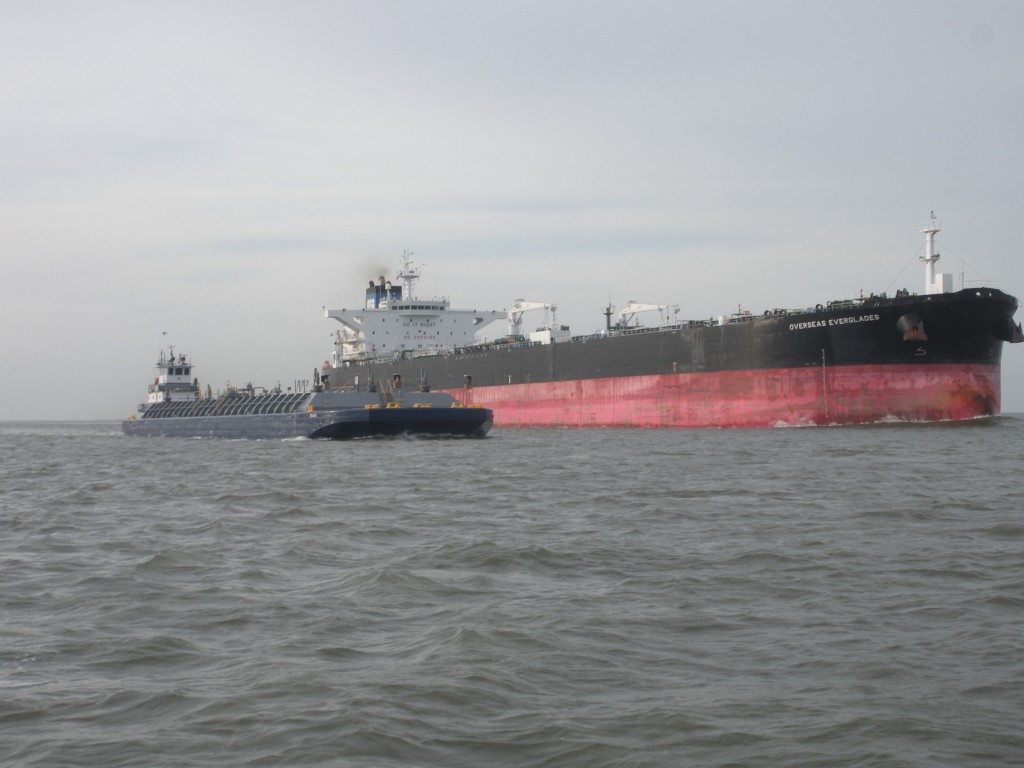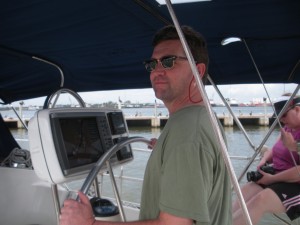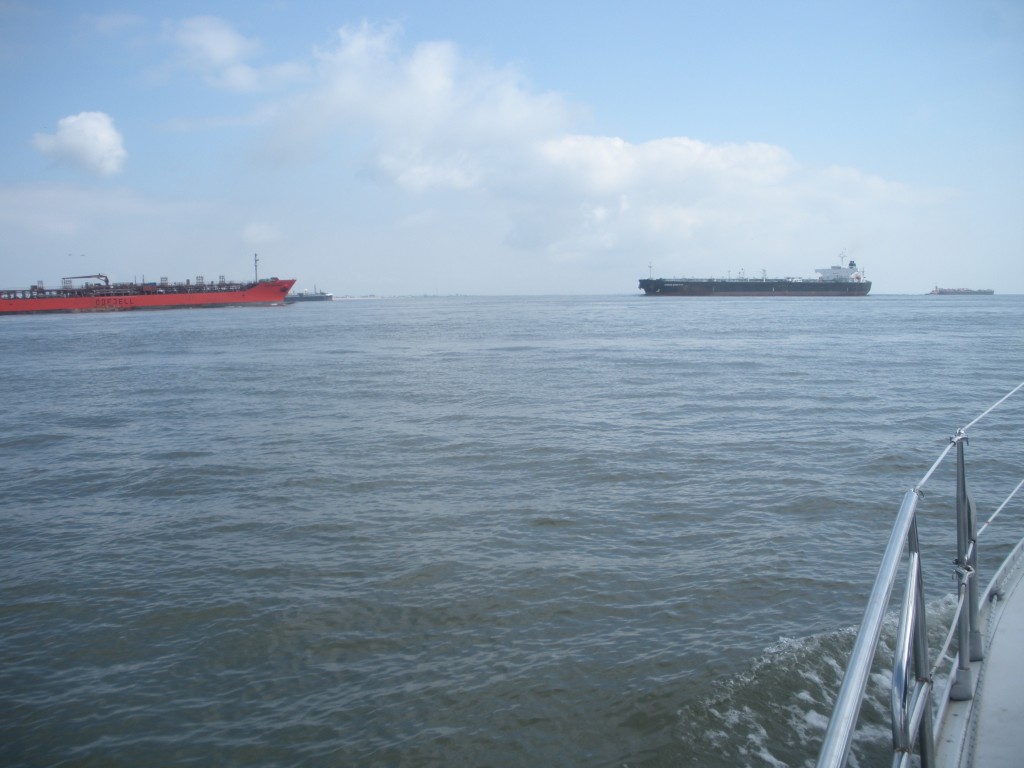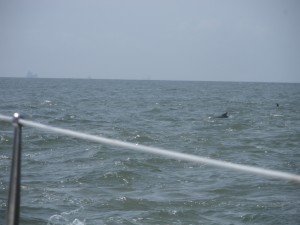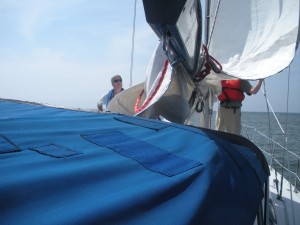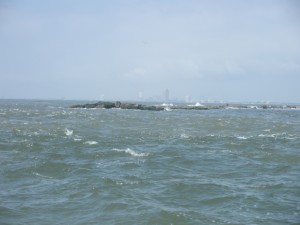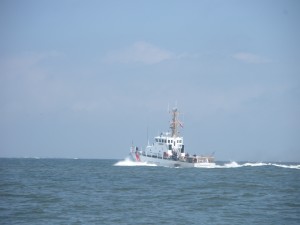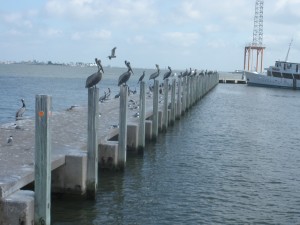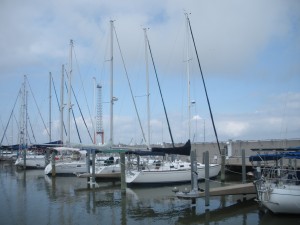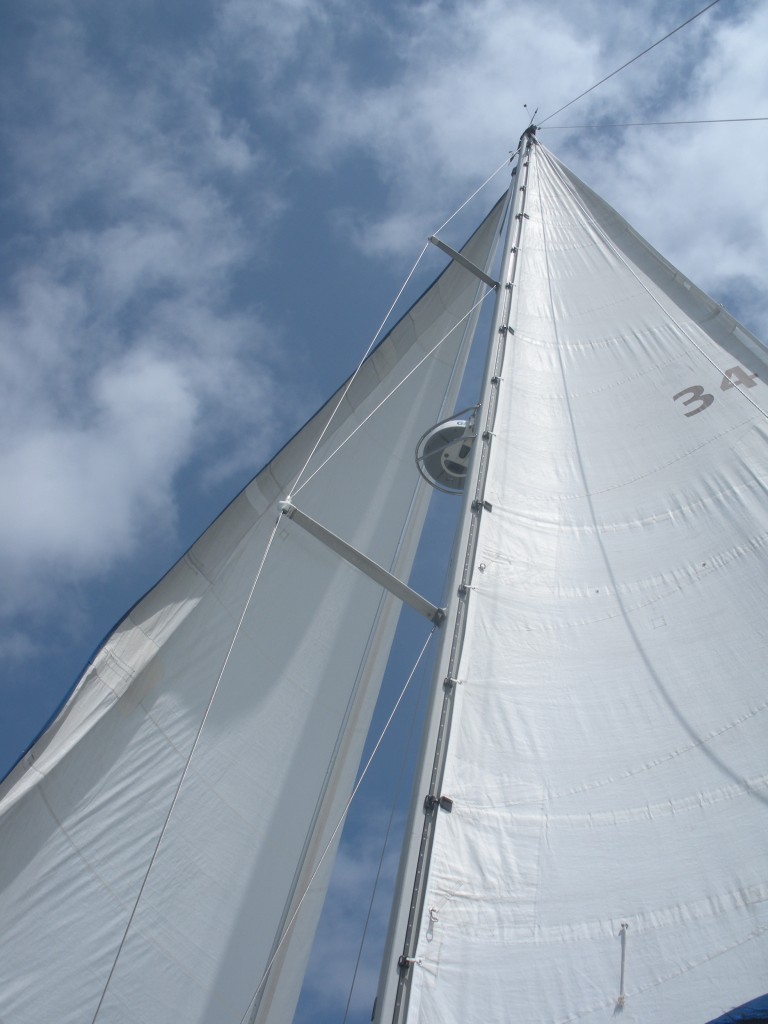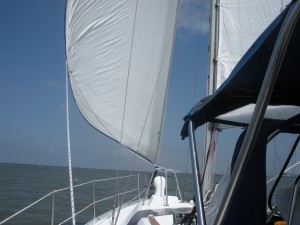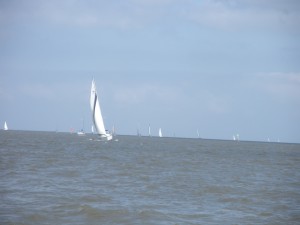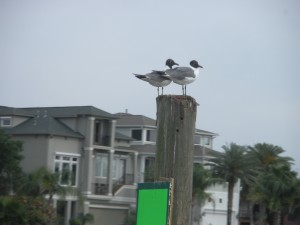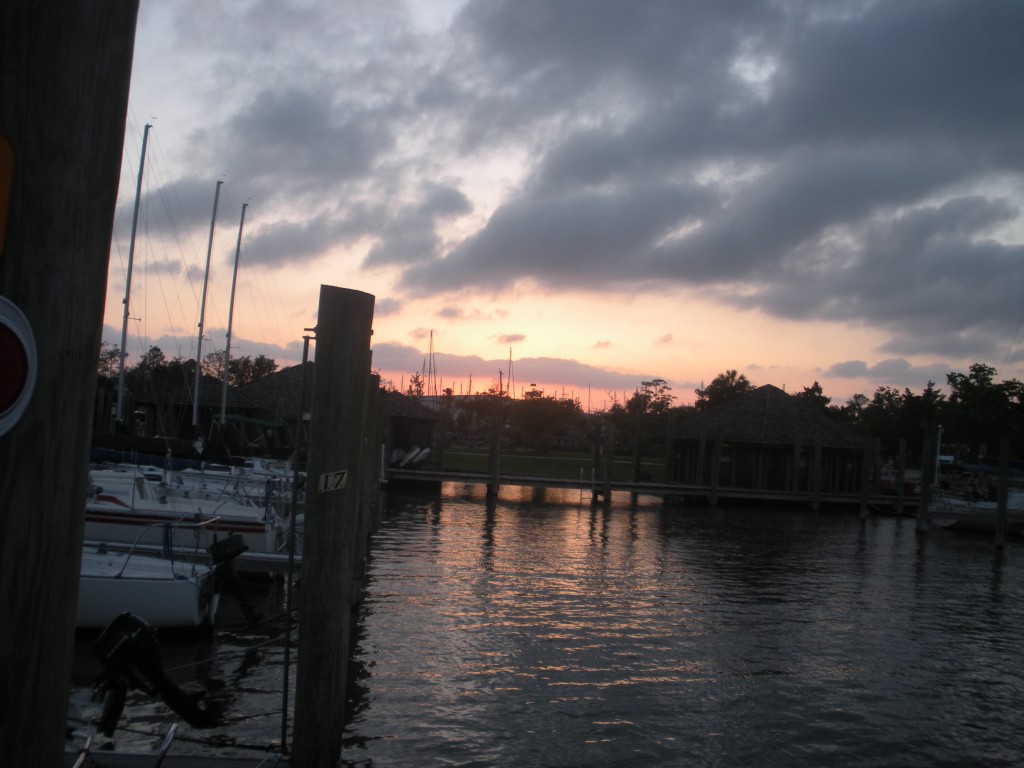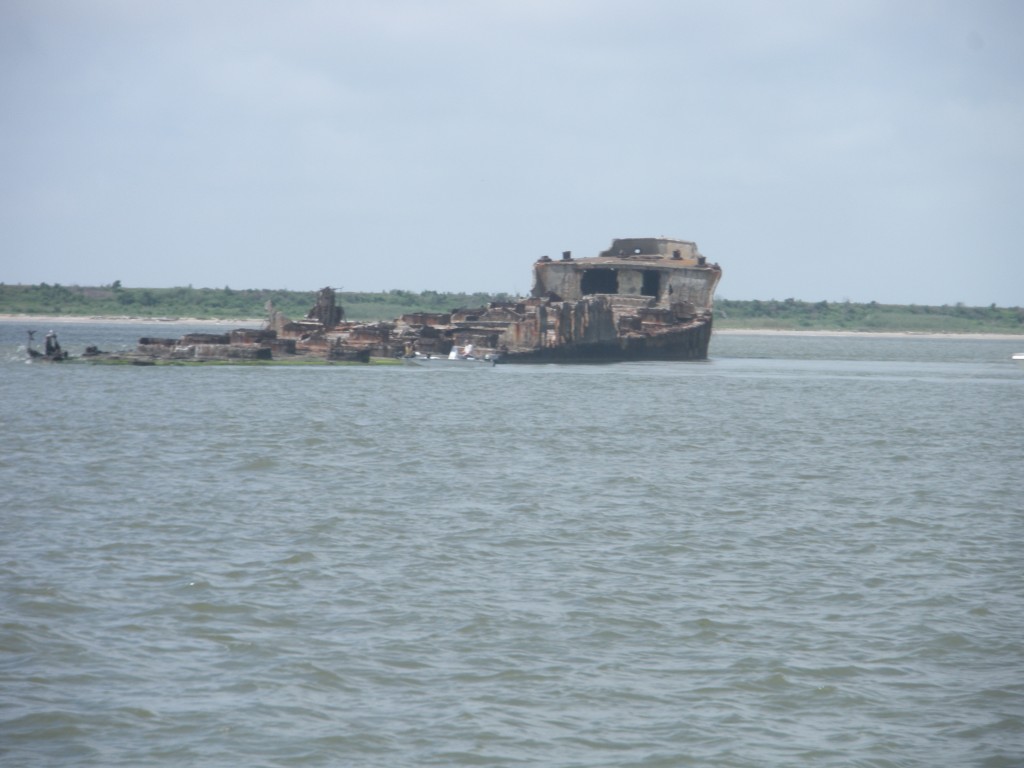Arrival and Day One
We signed up for coastal navigation classes at the Bay Area Sailing School in Kemah, Texas. It’s a three day course combining actually a couple of ASA courses, Basic Coastal Cruising and Bareboat Chartering. It started Friday morning with orientation at 9:00.
We of course signed up for the class with Terry and Christine, our sailing comrades. We took a couple of days’ vacation in order to arrive the night before, have some dinner, and generally chill out before class. We stayed at the South Shore Harbor Resort complex fairly close to the marina where the school is, it’s a pretty nice place.
Orientation consisted of climbing aboard s/v Sails Call, a 39′ Beneteau monohull, exploring and discovering where everything is – heads, fridge, berths, life jackets, sail lines, sail lockers, lazerettes, anchor, winches, etc. After that we went back to the school building for our sail briefing.
Capitain Dave pulled out a large chart of the Houston Ship Channel and Galveston Bay. He asked us some basic questions, to make sure that we really did know the basics from our 101 class. We talked about our previous sail experiences in the BVI and other places. Now on to the chart…
He pointed out where we were on the chart, and gave an outline for where we would go on the course. We would start in Kemah, sail out to a slip on Galveston Island off the Galveston Channel. That would take us a couple of hours to complete, we would have to transit out to the Houston Ship Channel (HSC) and head southeast toward Galveston. We would stay overnight on the boat in the marina. The next day would take us back out to the HSC, further southeast out past Galveston Island, past the jettys and out to the open seas of the Gulf of Mexico. After sailing on open water we’d return back to the slip in the Galveston marina for another night, and then on Sunday we’d sail back to Kemah. Hey it all sounded good to us, but learning is in the doing, right?
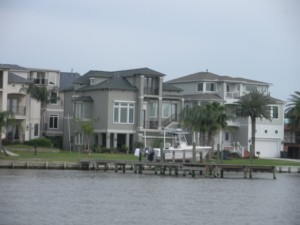 Terry backed the boat out of the slip, cleared us out of the marina and we headed downstream out of Clear Lake, past some really nice houses, the Kemah amusement park and entertainment/dining center, and
Terry backed the boat out of the slip, cleared us out of the marina and we headed downstream out of Clear Lake, past some really nice houses, the Kemah amusement park and entertainment/dining center, and 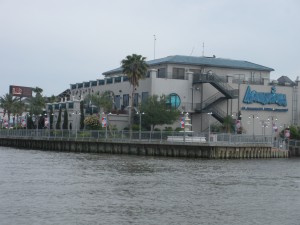 underneath the huge bridge that allows tall ships to pass under. Once we were out in the bay we raised the sails and motor-sailed out to the HSC. We learned that the Galveston bay is quite shallow, usually about 10 to 3 ft deep everywhere.
underneath the huge bridge that allows tall ships to pass under. Once we were out in the bay we raised the sails and motor-sailed out to the HSC. We learned that the Galveston bay is quite shallow, usually about 10 to 3 ft deep everywhere.
So that kept us close to the dredged channels that were maintained between 20-40 feet depths to accommodate the commercial vessels. We sailed on a starboard beam reach until reaching the HSC. 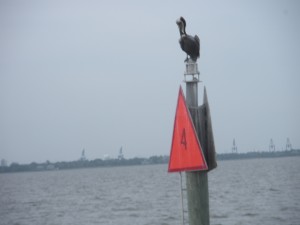 Turning to starboard to head down the channel we quickly discovered that the wind and current were totally not cooperative to our lessons. We were heading southeast in the HSC and that’s exactly where the wind was coming from. We dropped sails and motored for several hours. I think this is when after everyone had had their turn at the helm it became my turn.ÂÂ
Turning to starboard to head down the channel we quickly discovered that the wind and current were totally not cooperative to our lessons. We were heading southeast in the HSC and that’s exactly where the wind was coming from. We dropped sails and motored for several hours. I think this is when after everyone had had their turn at the helm it became my turn. 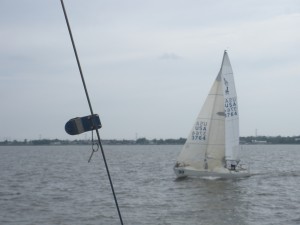 We had originally planned to reach the Galveston marina before nightfall but we weren’t making good time against the strong wind and current. With Captain Dave’s guidance I piloted down the Galveston Ship Channel after sundown, past the sunken concrete ship (yes they do make ships out of concrete) and parked in the slip at the marina. We secured everything and headed out to a local restaurant for dinner. After that it was time to call it a night because class started early the next day, Saturday.
We had originally planned to reach the Galveston marina before nightfall but we weren’t making good time against the strong wind and current. With Captain Dave’s guidance I piloted down the Galveston Ship Channel after sundown, past the sunken concrete ship (yes they do make ships out of concrete) and parked in the slip at the marina. We secured everything and headed out to a local restaurant for dinner. After that it was time to call it a night because class started early the next day, Saturday.
Day Two
On Saturday morning Judith piloted the boat out of the slip this time and after everyone got practice docking and undocking the boat in its slip, we went to an area nearby where we practiced dropping and setting the anchor.
There’s a heck of a lot more to anchoring a boat than merely tossing a heavy object tied to a chain overboard. You have to know how deep the water is in order to let out the correct amount of line for your depth.
Then you have to back down on the anchor, backing the craft away from the anchor hoping that it will dig in to the sea bed to get a solid holding. Christine and I had the duty to bring the anchor back up on the boat after we had done our drills. Man, that thing was filthy when we lifted it out of the water, it brought up a bunch of muck with it from the bottom of the channel. We had to be real careful not to get any of that crap on us, not an easy task while working with an awkwardly balanced 50 lb hunk of metal. After that exercise, we went back out to the HSC, continuing our way down the channel out to the Gulf. But it was the same story as Friday, wind and current were strong against us, so we didn’t raise the sails and motored down the channel while giving wide berth to the HUGE commercial sea transports and barges coming and going from the Port of Houston.
Now the ship channel is pretty big, like 200 yards wide on average and that has to accommodate ships traveling both directions. So it’s very much like a surface road but without a stripe down the middle. Just like a street you have to stick to the right, opposing traffic should always pass you on the port side.
There’s not a lot of leeway with those big boats and barges that can’t leave the channel or they’ll run aground in the shallow bay. And because of the dredging it is actually very shallow just outside the channel, like three or four feet depth in some places. You have to keep an eye on the channel marker buoys and watch out for the traffic. These commercial cargo ships are big, like the one that rescued Tom Hanks in Castaway. And we were close, sometimes as close as 75 feet or so, and we didn’t want to get much closer.
Steadily against the wind and current we slugged our way toward the Gulf. We were past Galveston Island, but not past the jetties which shelter the HSC and help break up the waves on the way in and out. Finally we were out past the jetties but not too far out and it was time to hoist the sails. We cut the engine back and pointed into the wind and started our task.
However just as the sails were up the diesel heat alarm went off and we had to cut the engine. We had really tasked the engine against the wind and current and it was running very hot, but because it was being cooled by the sea water pumping through it there wasn’t any issue while we were under way. But when we backed the throttle down in order to raise the sails, that reduced the amount of cooling sea water going through it and the engine overheated. So we had to turn it off.
But we weren’t out far enough away from the jetties yet, and we were being blown back into them. We couldn’t turn starboard as we’d either hit the jetty or likely become grounded. We couldn’t turn port because that would put us directly in the traffic of the country’s third busiest shipping channel. And with no motor currently available we had to surrender, we gave up going out to the Gulf and merely turned around and headed back toward the Galveston marina under sail.
Just before reaching the Galveston Ship Channel I was the helm hog again and took the helm tacking west along the channel. It was a busy little channel and we had to dodge and weave around all the traffic; barges, ferries, pleasure craft, shrimp boats, Coast Guard, etc… We passed by a couple of cruise ships, one of the cruise ships was the same one that we were guests on about 4 months earlier.
When we got to the end of the channel Terry took the helm and we turned around and tacked our way back to the marina. After Terry took the boat in to dock it in our slip, we brought out the food for a on-board prepared and cooked meal. Steaks and salad and veggies and of course beer and boat drinks.  We stayed up talking with Captain Dave and we all had a good time.
Tomorrow we were to head back to Kemah.
Day Three
Well, remember all that uncooperative current and wind? On Sunday it turned out to be a real blessing. The ride back was a sailing dream. Our foes the wind and current became our friends and it was truly amazing.
Wing-on-wing is when you’re sailing downwind and you have the jib let all the way out to one side and the main sail is let all the way out on the other side. Now sailing this way isn’t so much of a challenge if you can change direction as necessary to stay nearly directly down wind.
But we were constrained by the channel and really couldn’t deviate from the course. We were very lucky that we were able to go wing-on-wing without having to change direction for about three or four hours, with Christine at the helm almost the whole way. It was so peaceful we were able to get some last minute studying and exam cramming in.
We eventually took turns at the helm, and of course I was hogging the helm again when we had to turn westerly to head toward Clear Lake. All of that strong wind peacefully pushing us down wind was about to change. Christine and Judith were below deck and were completely unaware of the pending direction change. They were eating gummy bears at the time when their world was about to be turned sideways without warning! At buoy #63 we jibed to port and the Beneteau heeled way over in the strong breeze. All the guys were topside and we heard screams and laughter from down below. Terry took the helm I went below to see what the commotion was… Judith and Christine were falling all over the place, laughing up a storm, stumbling around because they wouldn’t let go of the gummy bears in their hands to grab something else to stabilize on. It was hilarious.
On the way back to Clear Lake we were in a relatively deeper part of the bay where we started our man overboard drills. Everyone was assigned a duty – helmsman, spotter, sails, and hooker. The hooker is the one with the boat hook that picks up “Sally” out of the water with a boat hook when the boat gets to her. Sally is a bright orange boat fender with a weight and a tussle of blonde rope frays on top. Sally goes overboard and everyone kicks into action for rescue drills. After a couple of drills we had something go wrong with the boat’s jib sail rigging in the middle of the drill and we (that would be, um, me :-/ ) lost sight of Sally. It is really hard trying to find a small thing in a big bay if you don’t know where it is. After we fixed the rigging, we set about searching for Sally. About half an hour or 45 minutes of looking we were ready to give up, but luckily we spotted Sally adrift in the distance and were able to rescue her. We spent about 2 hours on the man overboard drills. When everyone had their turn at the helm for the rescue, it was time to head back to Kemah.
The sail back to home port was fairly smooth and uneventful, back to sightseeing the big houses on the channel and other sail and power boats making their ways along the lake.
Pulling into the slip, however, brought some excitement. Judith was at the helm and there was a strong southerly wind. The dock was perpendicular to the wind and the slip we needed to pull into was upwind and we had to turn port to do it. Per the Captain’s instruction, Judith needed to be very close to the slips on the starboard side in order to swing the craft into the slip. Judith, being the “question authority” person she is, asked 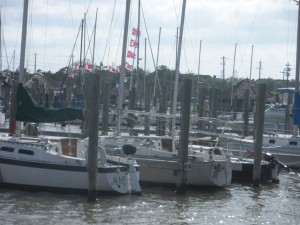 Captain Dave if she was too close to the opposite pier, but Captain Dave said she needed to be even closer. Alas, with the strong wind we were pushed so close to the slips on the starboard side we clipped a bow spirit railing of another boat with a loud “clang” noise! By this time we had missed our turn to get into our slip, so Cap’n Dave took over and backed the boat up so we could try it again. Also because of this minor collision that everyone in the marina heard, we started to get attention from people on the docks.
Captain Dave if she was too close to the opposite pier, but Captain Dave said she needed to be even closer. Alas, with the strong wind we were pushed so close to the slips on the starboard side we clipped a bow spirit railing of another boat with a loud “clang” noise! By this time we had missed our turn to get into our slip, so Cap’n Dave took over and backed the boat up so we could try it again. Also because of this minor collision that everyone in the marina heard, we started to get attention from people on the docks.
Cap’n Dave started the second approach, again on the starboard side of the dock channel. Naturally the wind blew strong and all of us on board had to fend off from running into the boats and piers on the opposite side of our slip. Yep, another collision occurred, “clang!”. But this time we were able to turn in time to pull in to the slip. The boat’s owner had come down to wait for us at the slip – I’m sure he had heard the ruckus at the dock. Everything was all right however, there was no damage at all to any of the equipment involved except for maybe a couple of scrape marks on the stainless railings.
We spent the rest of the afternoon in examination preparation and taking our exams. They were graded on the spot by Captain Dave and we all passed. I think Judith got a point or two higher score than I, drat. Well there’s always the Celestial Navigation class that we plan on taking…
Plans now call for Terry and Christine taking their first bareboat charter this week. They’ve gone to the BVI with their daughter and two other parties. We can’t wait to hear about their adventures about their inaugural bareboat sail. Wish we were going with them, but we’re going to have to wait until next spring for that.
Oh, and here’s what a sunken concrete boat looks like.

